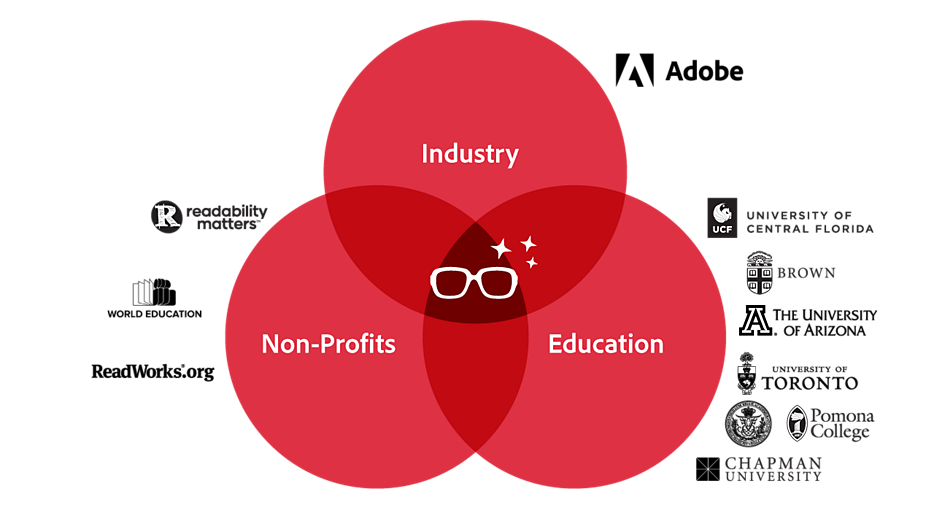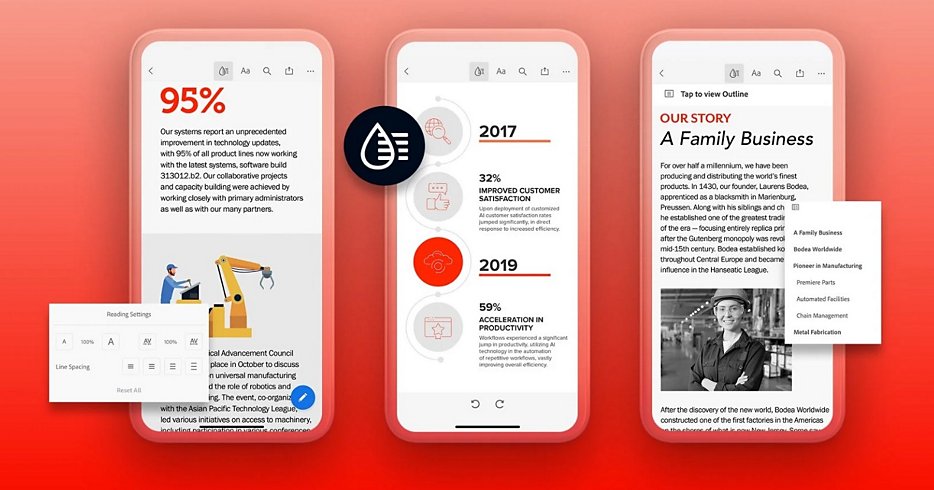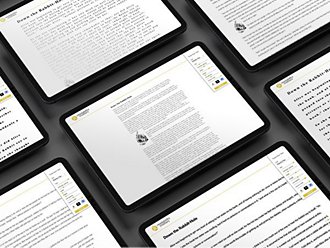Better reading for all.
We’re working with educators, nonprofits, and technologists to help people of all ages and abilities read better by personalizing the reading experience on digital devices.
Fast Company World Changing Ideas Awards 2021: Finalist
Adobe Announces Readability Consortium with Google and University of Central Florida to Improve Reading for All.
54% of U.S. adults ages 16 to 74 years old (130 million people) lack proficiency in literacy, reading below a sixth-grade level.
Source: U.S. Department of Education
Improving readability through personalization.
Reading is foundational to acquiring knowledge and sharing ideas, but most children and adults worldwide don’t read at their optimum capacity. Technology can change this. New digital innovations (such as Liquid Mode in Adobe Acrobat Reader mobile) enable us to personalize reading to each reader and improve literacy for people of all skill levels.

Partnering with experts on research.
Adobe has invested years of research in using technology to improve the experience of reading digital documents. We’re partnering with higher education, reading experts, nonprofits, educators, and technologists to conduct research, run pilot programs, and share our learnings.
NEWS: Adobe Announces Readability Consortium with Google and University of Central Florida to Improve Reading for All
Learn more about The Readability Consortium
Product innovations for digital reading.
Adobe is using learnings from the Readability Initiative to reinvent how people read and extract information from digital documents. We took our first step with Liquid Mode, a tool in the free Adobe Acrobat Reader app that lets you effortlessly read documents on mobile devices. Liquid Mode uses Adobe Sensei AI and machine learning technology to understand the structure of PDFs, enhance readability, and unleash on-the-go productivity.


Read the latest research
Review the newest findings from Adobe and our partner researchers studying the effects of reading formats and technology on reading outcomes for all learners.

Find your best reading style
Take our quiz in the Virtual Readability Lab to discover your fastest font, best spacing, and favorite font for reading, and participate in more reading studies.

Pilot in classrooms
We’re looking for K-12 and higher education institutions, curriculum developers, and education companies to pilot readability tools in real-world situations and share their findings.
Join us in making reading better for everyone.
Watch recent talks on Readability.
New Directions in Readability and Accessibility" session at Adobe MAX 2022
Learn more
“Creating Value with Personalized Readability Formats” session at the Adobe MAX 2021
“One Font Doesn’t Fit All: Type Design and Comprehension” session at the Adobe MAX 2021
“Personalizing Reading: One Size Doesn’t Fit All” session at the 2021 SXSW EDU
Towards Individuated Reading Experiences: Different Fonts Increase Reading Speed for Different Individuals (ACM TOCHI, 2022)
Shaun Wallace, Zoya Bylinskii, Jonathan Dobres, Bernard Kerr, Sam Berlow, Rick Treitman, Nirmal Kumawat, Kathleen Arpin, Jeff Huang, Ben Sawyer
This journal paper presents a large-scale crowdsourced reading study that compares the readability of 16 different fonts. Readers were able to read 35% faster in their best fonts compared to their worst fonts, and which font was best depended on the individual reader, pointing to the need to customize font choices for different readers.
Accelerating Adult Readers with Typeface: A Study of Individual Preferences and Effectiveness (ACM CHI LBW, 2020)
Shaun Wallace, Ben Sawyer, Rick Treitman, Zoya Bylinskii, Jeff Huang
This short paper presents the design of a reading test for remote, online research studies to investigate the effects of typeface on preference, reading speed and comprehension. The first of our studies, this work presented evidence that one font does not fit all, and that fonts people like are different from the ones they are fastest reading in.
Personalized Font Recommendations: Combining ML and Typographic Guidelines to Optimize Readability (ACM DIS, 2022)
Tianyuan Cai, Shaun Wallace, Tina Rezvanian, Jonathan Dobres, Bernard Kerr, Samuel Berlow, Jeff Huang, Ben D. Sawyer, Zoya Bylinskii
This paper presents FontMART, a font recommender capable of making personalized recommendations for faster fonts to read with. In a study conducted with 252 crowdworkers, we found that the font recommendation from FontMART helped readers speed up by 14-25 words per minute, without hindering comprehension. This encouraging evidence provides motivation for adding our personalized font recommendation to future user interfaces.
Improving Reading Outcomes for Readers with and Without Dyslexia (Journal of Vision V-VSS, 2021)
Aleena Niklaus, Shaun Wallace
This abstract, presented as a poster at the Vision Sciences Society Annual Meeting, demonstrated the reading benefits of using a digital reading ruler, for dyslexic readers and the general population more broadly. Three different digital reading rulers were investigated, showing that different readers benefit from different reading ruler designs.
Readability Research: An Interdisciplinary Approach (accepted for publication in Foundations and Trends in Human-Computer Interaction)
Sofie Beier, Sam Berlow, Esat Boucaud, Zoya Bylinskii, Tianyuan Cai, Jenae Cohn, Kathy Crowley, Stephanie L. Day, Tilman Dingler, Jonathan Dobres, Jennifer Healey, Rajiv Jain, Marjorie Jordan, Bernard Kerr, Qisheng Li, Dave B. Miller, Susanne Nobles, Alexandra Papoutsaki, Jing Qian, Tina Rezvanian, Shelley Rodrigo, Ben D. Sawyer, Shannon M. Sheppard, Bram Stein, Rick Treitman, Jen Vanek, Shaun Wallace, Benjamin Wolfe
This long-form journal paper is both a survey and a guide to running readability studies. We discuss the components that come together to form reading experiments, including the typographic considerations, reading populations, experimental hardware (including eye trackers and brain imagining tech), metrics (speed, comprehension, preference, etc.), and analysis techniques. Authors of this paper include typographers, educators, vision scientists, neuroscientists, and computer scientists.
Our partners

The Virtual Readability Lab at University of Central Florida
Dr. Ben Sawyer is a leading researcher in computer-machine interaction who’s established a lab at UCF for state-of-the-art research in digital/electronic reading. Adobe is sponsoring the Virtual Readability Lab and collaborating with Dr. Sawyer and his team on multiple digital reading research studies.

By engaging an ecosystem of partners like Adobe, Readability Matters aims to make individual reading formats ubiquitous across devices and platforms.

Dedicated to improving the lives of the poor through education and social and economic development programs, World Education plans to pilot Adobe tools in adult education settings and share their findings.